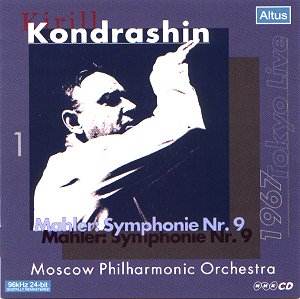In my recent
review of Kirill Kondrashinís splendid "live" Mahler Seventh
Symphony with the Concertgebouw Orchestra on Tahra (TAH451) I mentioned
that all his other Mahler recordings have been with Russian orchestras.
Here is one of them and in this case another "live" recording
made while the Moscow Philharmonic was on tour in Japan in May 1967.
Indeed I think this may well be a recording of the first ever performance
of the Ninth Symphony in Japan. In the chapter "Mahler and Japan"
in "The Mahler Companion" (published by Oxford University
Press and just
issued in paperback) Kenji Aoyagi provides a detailed table listing
the dates of all Mahler first performances in Japan. It shows the Ninth
as first heard there in 1967 when three performances suddenly took place
and none of them by local orchestras. Could it be that all three performances
were by the Moscow Philharmonic while on tour and that this Tokyo performance
was the first of those? Iím sure my Mahler friends in the orient will
put me right if I am wrong.
Kondrashin projects the first movement in an appropriate
tempo for his fluent, flowing view of the piece and I believe it responds
much better to this kind of treatment as it allows the terrifying, death-haunted
climaxes to find better context in a nostalgically charged atmosphere.
This framing of the climaxes must assist Kondrashin in the way that
he appears to be able to blacken the soul of the music when needed.
There are a couple of surprises, though. The passage starting at bar
211 marked leidenschaftlich (passionate) is taken very fast.
So too is the short duet for flute and solo horn prior to the coda that
emerges like a strange shadow play unlike any version I have heard.
Neither detracts from the fulsome, very sung account that Kondrashin
gives of the movement as a whole with that essential and unmistakable
quality of being taken in one breath.
The second movement scherzo has plenty of character,
especially in the first two of Mahlerís three tempi. These bounce along
beautifully to then need only a very subtle change for the third tempo
marking to make its effect while still keeping up the impression that
beneath it is a bustle just out of sight. The ensemble of the Soviet
orchestra does become compromised a little in some of Mahlerís more
lethal passages of rhythmic complexity, however. The same applies to
the Rondo Burleske third movement, though more than enough of Mahlerís
late-in-life bitterness is left. The big let down for me is the nostalgic,
dreamy interlude passage which Kondrashin almost seems to be embarrassed
by, which is very strange. He is usually so good at recognising a switch
in mood, but here he just seems to misfire completely so that when the
main material returns it is as if it had never been away. I am willing
to believe that a conductor of Kondrashinís stature had good reason
for this but I cannot, at the moment, decide what it might be.
In the final movement the strings of the Moscow Philharmonic
are rich and trenchant and Kondrashin has the measure of the music yet
again, especially the mixture of passion and nostalgia at its core and
they really pile on the tone in a searing fashion. It makes up somewhat
for the disappointment of the third movement interlude and also counterbalances
the first movement that on some performances can overbalance the work.
The principal drawback on this recording is the orchestra.
But I donít mean their commitment to the music, or to Kondrashinís interpretation
of it, as both are palpable from start to finish. Rather the fact that
this is very much Soviet-era orchestral playing "red in tooth and
claw". So be prepared for the coarse trumpets and, most irritating
of all, those horns with that wide and fruity vibrato familiar on all
those Melodiya releases of the 60s and 70s. The latter is especially
painful in the solo horn passages that abound in this work and I donít
think you will want to repeat the experience too often if you are used
to your Mahler played by bands from Vienna, Amsterdam, London or New
York. I think there are also some ensemble problems that can be laid
either at the door of touring conditions or unfamiliarity with the music,
but nothing so serious as to rule this out of court for those Mahlerians
with a taste for "live" performances by under-represented
conductors. Because the main reason for hearing this release is Kirill
Kondrashin himself. His grasp of Mahlerís overall structure and his
balancing of it with an almost unerring flair for detail is so impressive
that it makes me wish again that someone had had the idea of recording
a complete cycle with him and one of the great European or American
orchestras.
The recorded sound is immediate and strong on detail
though there are level fluctuations at the start on my copy at least.
These soon resolve but you have to listen through them with patience.
But then this is one of those occasional recordings, hors de combat,
which you wouldnít reach down very often in preference to the main reference
versions in the catalogue. Which is why I am not comparing it with any
others here. Let recordings like this one stand alone, and enrich our
experience of the many and various ways this composer can be performed.
An absorbing and distinctive "live" version
of Mahlerís Ninth that offers a challenging alternative to more familiar
versions.
Tony Duggan


